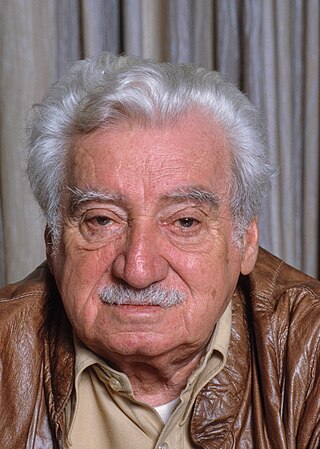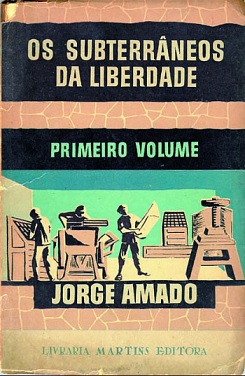
Plínio Salgado was a Brazilian politician, writer, journalist, and theologian. He founded and led Brazilian Integralist Action, a political party inspired by the fascist regime of Benito Mussolini.

Luís Carlos Prestes was a Brazilian revolutionary and politician who served as the general-secretary of the Brazilian Communist Party from 1943 to 1980 and a senator for the Federal District from 1946 to 1948. One of the leading communists in Brazil, Prestes has been regarded by many as one of Brazil's most charismatic yet tragic figures for his leadership of the 1924 tenentist revolt and his subsequent work with the Brazilian communist movement. The 1924 expedition earned Prestes the nickname The Knight of Hope.

The First Brazilian Republic, also referred to as the Old Republic, officially the Republic of the United States of Brazil, refers to the period of Brazilian history from 1889 to 1930. The Old Republic began with the coup d'état that deposed emperor Pedro II in 1889, and ended with the Revolution of 1930 that installed Getúlio Vargas as a new president. During the First Republic, the country's presidency was dominated by the most powerful states of São Paulo and Minas Gerais. Because of the power of these two states, based on the production of coffee and dairy, respectively, the Old Republic's political system has been described as "milk coffee politics". At local level, the country was dominated by a form of machine politics known as coronelism, in which the political and economic spheres were centered around local bosses, who controlled elections.

The Communist Party of Brazil is a political party in Brazil. The PCdoB officially adheres to Marxist–Leninist theory. It has national reach and deep penetration in the trade union and student movements.

Jorge Amado was a Brazilian writer of the modernist school. He remains the best-known of modern Brazilian writers, with his work having been translated into some 49 languages and popularized in film, including Dona Flor and Her Two Husbands in 1976. His work reflects the image of a Mestiço Brazil and is marked by religious syncretism. He depicted a cheerful and optimistic country that was beset, at the same time, with deep social and economic differences.

The Vargas Era is the period in the history of Brazil between 1930 and 1946 when the country was governed by president Getúlio Vargas. The period from 1930 to 1937 is known as the Second Brazilian Republic, and the other part of Vargas Era, from 1937 until 1946 is known as the Third Brazilian Republic.

Tenentism was a political philosophy of junior army officers who significantly contributed to the Brazilian Revolution of 1930 that ended the First Brazilian Republic.

The Bowels of Liberty is a trilogy of Brazilian Modernist novels written by Jorge Amado in 1954. The trilogy comprises Bitter Times, Agony of Night and Light at the End of the Tunnel.

The Fourth Brazilian Republic, also known as the "Populist Republic" or as the "Republic of 46", is the period of Brazilian history between 1946 and 1964. It was marked by political instability and the military's pressure on civilian politicians which ended with the 1964 Brazilian coup d'état and the establishment of the Brazilian military dictatorship.

Washington Luís Pereira de Sousa was a Brazilian politician who served as the 13th president of Brazil. Elected governor of São Paulo state in 1920 and president of Brazil in 1926, Washington Luís belonged to the Republican Party of São Paulo (PRP) and served as the last president of the First Brazilian Republic.

Olga Benário Prestes was a German-Brazilian communist militant executed by Nazi Germany.

Zélia Gattai Amado de Faria was a Brazilian photographer, memoirist, novelist and author of children's literature, as well as a member of the Brazilian Academy of Letters. Gattai wrote 14 different literary works, including children's books and her own personal memoirs have been widely published.

The Paulista Republican Party was a Brazilian political party founded on April 18, 1873 during the Itu Convention and sparked the first modern republican movement in Brazil.

João Pessoa Cavalcanti de Albuquerque was a Brazilian politician and lawyer who served as the governor of Paraíba between 1928 and 1930.

The Knight of Hope or The Life of Luis Carlos Prestes is a 1942 book by Jorge Amado, a biography of the well-known Brazilian revolutionary Luis Carlos Prestes. It has not been published in English.

Getúlio Dornelles Vargas was a Brazilian lawyer and politician who served as the 14th and 17th president of Brazil, from 1930 to 1945 and from 1951 until his suicide in 1954. Due to his long and controversial tenure as Brazil's provisional, constitutional, dictatorial and democratic leader, he is considered by historians as the most influential Brazilian politician of the 20th century.
Socialism in Brazil is generally thought to trace back to the first half of the 19th century. There are documents evidencing the diffusion of socialist ideas since then, but these were individual initiatives with no ability to form groups with actual political activism.

Events in the year 1946 in Brazil.

The Brazilian communist uprising of 1935 was a military revolt in Brazil led by Luís Carlos Prestes and leftist low-rank military against Getúlio Vargas's government on behalf of the National Liberation Alliance. It took place in the cities of Natal, Recife, and the capital Rio de Janeiro between 23 and 27 November 1935. The uprising was supported by the Brazilian Communist Party (PCB), then called the Communist Party of Brazil, and the Communist International.
















